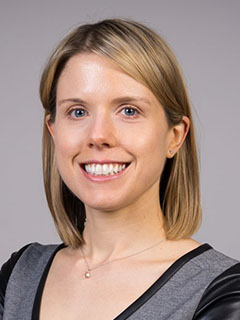2010 New Investigators Research Grant
From Theory to Practice
 What does one do, finally, with an undergraduate degree in linguistics from Harvard, a master’s in communication disorders from Boston University (BU), and a PhD in linguistics from MIT?
What does one do, finally, with an undergraduate degree in linguistics from Harvard, a master’s in communication disorders from Boston University (BU), and a PhD in linguistics from MIT?
Ask Tara McAllister Byun, who, by the way, is also a speech-language pathologist, having completed a clinical fellowship in the Department of Neurology at Children’s Hospital, Boston. McAllister Byun has always loved the challenge of tackling puzzles in linguistic theory. During her graduate studies at MIT, however, she realized that this highly theoretical training alone would be too limiting to allow her to carry on the work that interested her most. She needed the hands-on skills of an SLP to lend the necessary practical edge to her research.
The resulting combination of theory and practice, she reasoned, would allow her to accomplish work that would improve the quality of life for the individuals who would actually use the techniques she is pioneering. The use is, after all, the end. It’s what makes the work worthwhile.
What McAllister Byun now does is study children’s speech development as an assistant professor of communicative sciences and disorders at New York University. Her research hopes to elucidate how children’s early phonological development is shaped by articulatory and perceptual limitations. She is also interested in understanding why some children’s speech sound errors do not respond to conventional forms of treatment. And, thanks to her time at MIT, she is excited about ways in which new technologies can be used to enhance time-honored treatment methods.
Specifically, McAllister Byun is studying the efficacy of biofeedback treatment for speech, in which a real-time visual display is used to give clients a new perspective on what goes on while they talk. She has investigated different biofeedback techniques, such as using ultrasound imaging to view the shape and movements of the tongue, or using a real-time acoustic display to visualize the sound of speech. Recent studies have offered solid evidence that these techniques can be helpful for some children who have not responded to other forms of intervention. Now further research is needed to strengthen the evidence base for biofeedback and compare the efficacy of different biofeedback technologies.
McAllister Byun is also interested in understanding what she and other researchers can do to help practitioners adopt the methods that are supported by clinical studies. Having attended the ASHFoundation Implementation Science Summit, it provided McAllister Byun says an opportunity for her to discuss how technology can be used to lower barriers in the translation of research to practice. “The reality is that most clinicians don’t have a large budget for new technologies or time to learn complicated techniques. My ultimate goal is to develop a free, user-friendly app so that biofeedback can become an everyday tool in the clinical toolbox.” (She advises those who want to learn more about this developing project to follow her Twitter feed, @ByunLab.)
"I'm a huge fan of the ASHFoundation," says McAllister Byun, which she credits—no small feat—with helping to establish her career. She’s certain that her 2010 New Investigators Research Grant also resulted in the publication of her first paper in the American Journal of Speech-Language Pathology and lent her the credibility she needed to receive an R03-level grant from the National Institute on Deafness and Other Communication Disorders of the National Institutes of Health.
But why should the ASHFoundation influence stop there? Now McAllister Byun is hoping that her work on technologically enhanced speech interventions will generate research support in the form of an NIH RO1-level grant. And why shouldn't it? She’s on a roll.
View More Recipient Spotlights